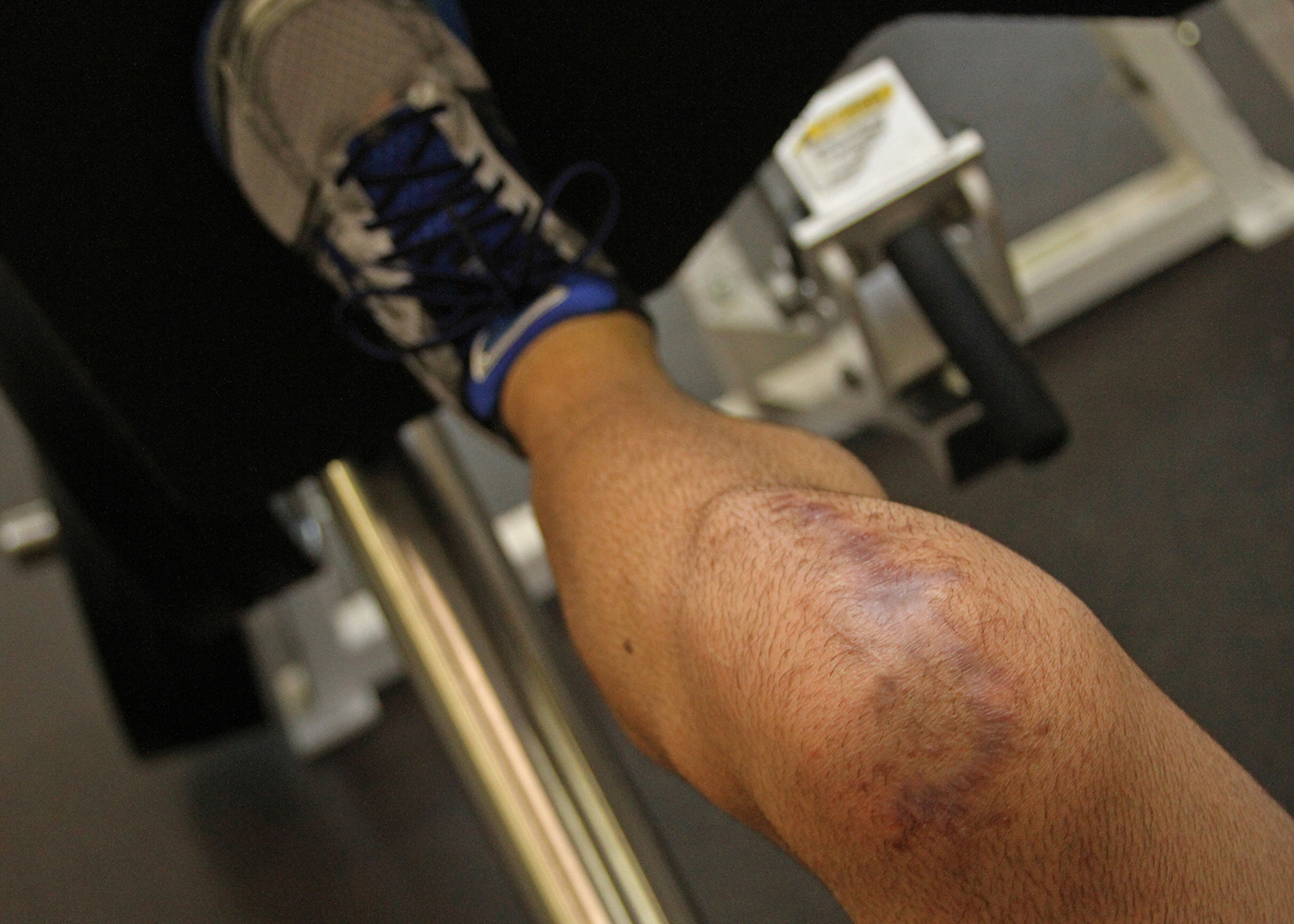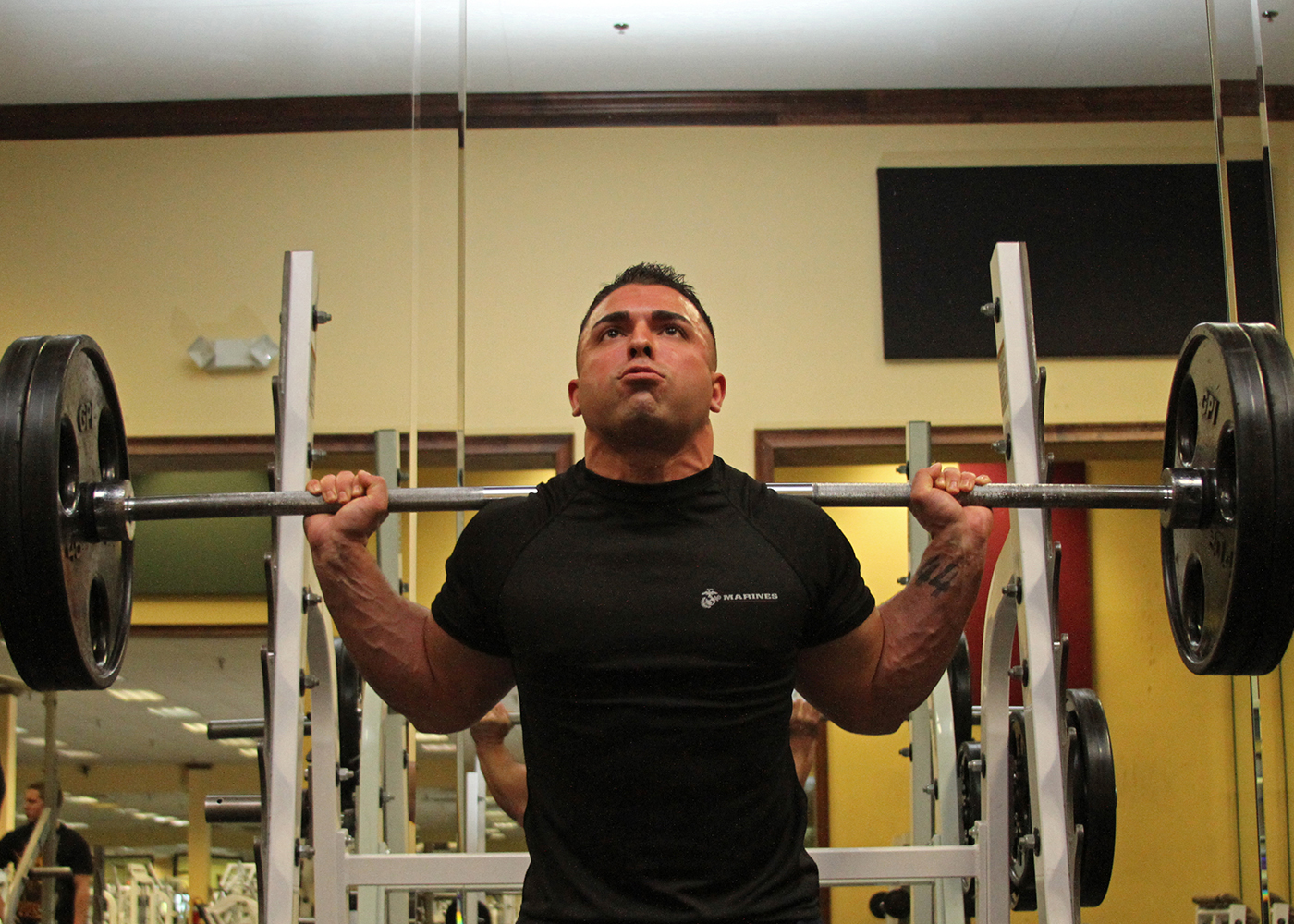
Sgt. Landon Rios, a canvassing recruiter with Recruiting Substation Augusta, Recruiting Station Columbia, performs a leg press exercise at Gold’s Gym on Dec. 17 in Augusta, Ga. Rios recovered from a patellar tendon tear and severely damaged kneecap in his left knee, a broken toe, and road rash after a motorcycle accident on June 20. (Marine Corps Photo by Sgt. Aaron Rooks)
Rios suffered from a patellar tendon tear and severely damaged kneecap in his left knee, a broken toe, and road rash. Medical professionals determined that Rios’ condition warranted an emergency surgery to repair the knee and lessen the potential for infection. His surgery began within the hour.
Meanwhile, a nurse at the hospital spoke with Tyciak over the phone about the severity of Rios’ condition. Tyciak and his Marines departed their recruiting office immediately for the hospital.
“I was very concerned for his health,” said Tyciak, who served as an AH-1Z Cobra and UH-1 Huey power plant mechanic prior to recruiting. “We were all worried about him.”
Tyciak and his Marines visited Rios following the surgery, but he was unconscious. Hours passed when he finally awoke. He opened his eyes, disoriented, attempting to identify the figure next to him. It was Sgt. Maj. Anthony N. Page, the senior enlisted advisor of RS Columbia.
Hours before the accident, Page was conducting a command group visit in support of the recruiting substation in Greenville, S.C. He departed the Greenville recruiting office immediately after hearing the news of Rios’ hospitalization and emergency surgery.
“His well-being was more important than recruiting,” Page said. “He is one of ours. If a Marine is hurt anywhere, we go and tend to that Marine. He became my number one priority at that very moment.”
Rios said, according to his nurse, Page waited at his bedside for several hours as he recovered from surgery. Within seconds of waking up, Rios asked Page about the fate of his career. Rios said Page told him he was too great of an asset for the Marine Corps to lose and proceeded to provide words of encouragement.
“I thought my career was over,” Rios said. “For Sgt. Maj. Page to be there for me in the environment and personally check on me and reassure me, it was an overwhelming experience for me.”
Page’s reassurance fueled Rios’ journey to reclamation.
Rios spent the next two weeks in agony, but not solely from pain as one would expect. His doctor mandated that he remain off his feet in bed as often as possible. A cast covered the majority of his left leg, from his upper thigh down to his ankle. He couldn’t walk on his own even though he wanted to. Jokingly, he stated that some people referred to his recovery period as a vacation. He disagreed. To him, his bed was a dreaded island in which time seemingly stood still.

Sgt. Landon Rios, a canvassing recruiter with Recruiting Substation Augusta, Recruiting Station Columbia, performs a set of weighted squats at Gold’s Gym on Dec. 17 in Augusta, Ga. Rios surprised doctors by recovering from his June 20 motorcycle accident within six months. (Marine Corps Photo by Sgt. Aaron Rooks)
Disabled by his injuries, he relied on the support of others like his roommate and fellow canvassing recruiter, Sgt. Ashley Harrod. The Lexington, Ky. native helped guide Rios in the weeks after the accident. He continued serving as a recruiter with his own mission requirement, but he still found the time to check on Rios throughout the day. He prepared Rios’ daily meals and returned periodically each day to check him.
“He could do very little on his own,” Harrod said. “I didn’t mind helping him out because that’s what Marines do.”
Two weeks passed, and the heavy cast remained attached to Rios’ damaged leg. But that did not stop him from making his trips to the apartment gym. Harrod said Rios performed very light workouts at first with an emphasis on not bearing weight on his left leg. Harrod initially had doubts about his ability to maintain a workout regimen while recovering from his accident. However, after seeing his performance in the gym, Harrod knew that Rios would make a dramatic recovery.
Day by day, Rios returned to the gym. One familiar face approached him and asked, “Why are you in the gym now?” Another, “What happened to you?” Rios did not allow the perception of his incapacity to affect his path to recovery. He continued to push, day in and day out, to regain the physical strength and confidence that he lost in the accident.
Rios removed his cast after the six-week term mandated by his doctor. He continued his progression in a knee brace with the support of crutches. At 10 weeks, he put down his crutches and removed the large knee brace for the last time. He introduced leg activities to his workout regimen, to include leg extensions, leg lifts, rubber band squats, and parallel shuffles. At the 12-week mark, he completed his first jog on the treadmill. Weighted squats, lunges, leg presses, and leg curls entered the fray at week 13.
“I felt myself becoming stronger with each workout,” Rios recalled. “I am now doing everything I was doing before the accident, but I still feel that I can improve. My legs are strong, and I am running fast.”
The most difficult challenge of Rios’ life began on June 20. Many could have easily written him off as finished and beyond recovery. But those who mattered didn’t. His fellow Marines, from the recruiting office up to the recruiting station command group, remained by his side and supported him in his recovery. Rios reclaimed what he had lost, and he has returned to his role as a recruiter and as source of inspiration for those who take the challenge head on.